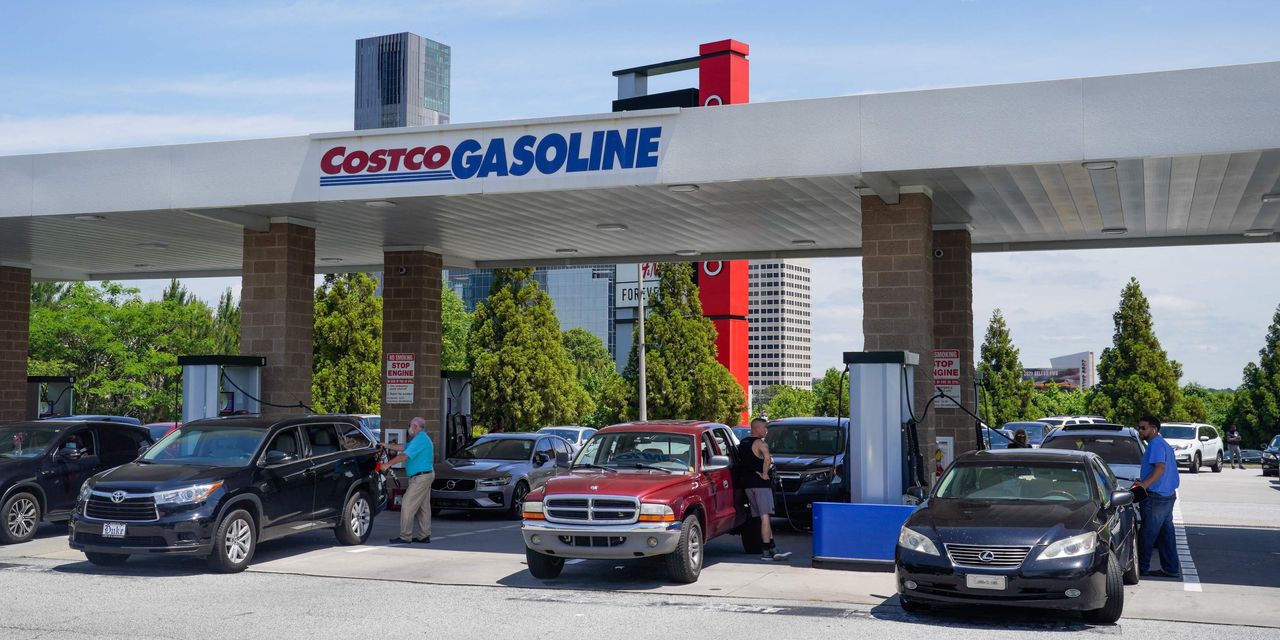Costco Wholesale Corp.’s stock slid 1.7% Friday, after the retailer reported another monthly same-store-sales declines in June, although it blamed the move on a lower price for gasoline and not stress on inflation-weary consumers.
The company’s same-store sales fell 1.4% in the month and were down 2.5% in the U.S. That was wider than the 0.3% decline posted in May.
Total sales edged up to $22.86 billion from $22.78 billion a year ago.
The average gas price was down 24% in June from a year earlier, when prices were riding high. Excluding gas and foreign exchange, same-store sales rose 3% in June and were higher in the U.S., Canada and in international markets.
The average transaction size fell 5.4%, partly due to the lower gas price. Foot traffic rose across the board and was up 3.6% in the U.S. Food, candy, sundries, tires and health and beauty were the stronger-performing categories, the company said. Home furnishings, toys and sporting goods were among the weaker categories.
D.A. Davidson analysts said the same-store-sales decline was the biggest since April of 2020, as the COVID pandemic was taking hold, and the biggest non-COVID-impacted decline since July 2016.
“Despite slowing sales, COST
COST,
has been an outperformer in our space year-to-date, up 18.0% versus the market up 14.9%
SPX,
and the XRT up 4.6%,” analysts led by Michael Baker wrote in a note to clients, referring to the SPDR S&P Retail ETF
XRT,
“But, we believe the recent run of somewhat softer comps, rather than the typical beats and raises may cause a pause in the stock,” said the note.
D.A. Davidson had a neutral rating on the stock.
Even adjusted for the lower gas price and forex impacts, the transaction size was negative, “which could be a signal that consumers are tightening up their budgets in the uncertain environment,” the note added.
“Solid traffic growth, in part, may be explained by COST’s model being
able to offer discounted prices to value oriented consumers, relative to other grocery businesses,” said the analysts, who had a neutral rating on Costco stock.
See also: Costco to clamp down on sharing of membership cards
Truist analysts took a more upbeat view and said that, while sales were a bit soft, core trends remain steady.
Necessities like food and sundries are still the main driver of the company’s top-line performance, rising by a high-single-digit percentage, while discretionary items are sagging, down by a low-single-digit percentage.
“Overall, we believe its value proposition should allow the company to continue to drive incremental share gains, and Costco can manage margins better than most. We remain buyers of COST,” analysts led by Scot Ciccarelli wrote in a note.
See more: Grocery prices are still going up, but Costco membership fees aren’t — for now
Oppenheimer, which had an outperform rating on Cosco’s stock, the equivalent of buy, agreed.
Multiyear U.S. sales trends “remain consistent,” analysts led by Rupesh Parikh wrote in a note.
“We continue to look favorably upon COST, and last month we re-added shares back to top-pick status,” said the note. “A membership-fee increase and a special dividend still represent potential positive catalysts down the road, in our view.”
Don’t miss: ‘Greedflation’ is replacing inflation as companies raise prices for bigger profits, report finds
Read the full article here


